For best results print the cards using the Firefox Browser
Cards
(QUICK LINKS: Decks | plants | mammals | birds | | reptiles | fish | cephalopoda | insects | microbe | events
( scientist | project | modifier | technique |)

Common Blackbird
Turdus merula

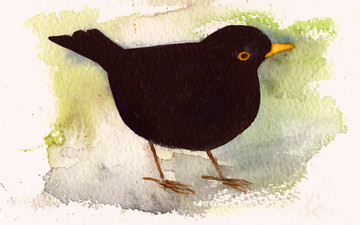
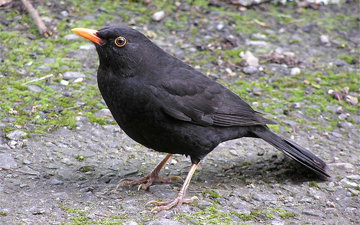
4 POINTS
Play: Turdus merula has a FLIGHT of 2.
Fact: Turdus merula migrates gregariously (in a flock).
cool, warm
Graphic by Ciaran Duffyhellociaran.com
Photo by Tony Willscommons.wikimedia.org/wiki/File:Blackbird_(male).jpg
The Common Blackbird, Turdus merula, is a species of true thrush. It is also called Eurasian Blackbird (especially in North America, to distinguish it from the unrelated New World blackbirds),[2] or simply Blackbird (in areas where it is the only blackbird-like species). It breeds in Europe, Asia, and North Africa, and has been introduced to Australia and New Zealand. It has a number of subspecies across its large […] read more

Antarctic Krill
Euphausia superba

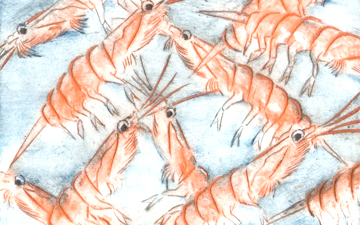
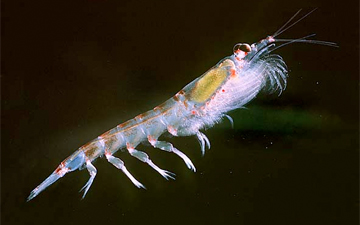
6 POINTS
• Euphausia superba has a MOVE of 1.
Krill are often referred to as light-shrimp because they can emit light, produced by bioluminescent organs.
Cold, Cool
Graphic by Elizabeth Bladeswww.elizabethblades.co.uk
Photo by Dr. habil. Uwe Kilsen.wikipedia.org/wiki/File:Krill666.jpg
Antarctic krill, Euphausia superba, is a species of krill found in the Antarctic waters of the Southern Ocean. Antarctic krill are shrimp-like invertebrates or crustaceans that live in large schools, called swarms, sometimes reaching densities of 10,000–30,000 individual animals per cubic meter.[1] They feed directly on minute phytoplankton, thereby using the primary production energy that the phytoplankton originally derived from the sun in order to sustain […] read more

Marbled Polecat
Vormela peregusna

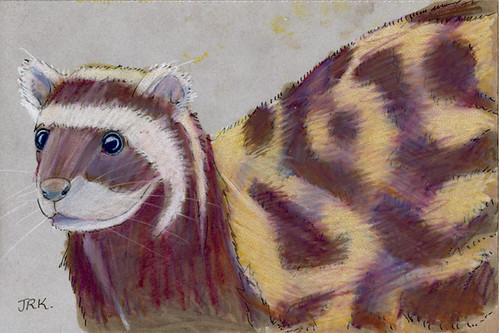
Sorry, there is no photo available. If you have one, please submit
here
.
5 POINTS
• Vormela peregusna has a MOVE of 2.
Vormela peregusna had once been sought for its fur; also known as fitch in the fur trade.
Cool, Warm
Graphic by Jennifer Rae Kinyakwww.dailymammal.com/
The marbled polecat (V. peregusna) is a small mammal belonging to the monotypic genus Vormela within the Mustelinae subfamily. Vormela is from the German word Würmlein[1], which means “little Worm”. The term peregusna comes from pereguznya, which is Ukrainian for polecat.[2] Marbled polecats are generally found in the dryer areas and grasslands of south-eastern Europe to western China. Like other members of Mustelinae, it […] read more
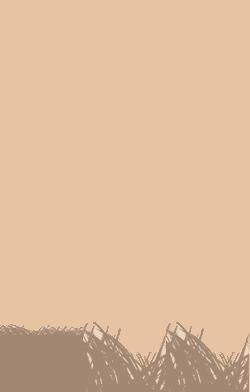
Ethiopian Wolf
Canis simensis

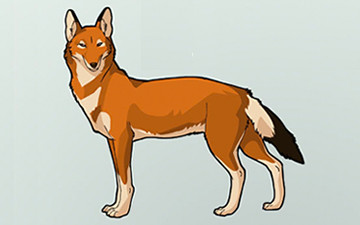
Sorry, there is no photo available. If you have one, please submit
here
.
9 POINTS • Canis simensis has a MOVE of 2. Canis simensis males never leave the pack into which they were born.
Warm, Hot
Graphic by Akela Takaakelataka.deviantart.com/
The Ethiopian wolf (Canis simensis), also known as the Abyssinian wolf, Abyssinian fox, red jackal, Simien fox, or Simien jackal is a canid native to Africa. The numerous names reflect previous uncertainty about its taxonomic position, but it is now thought to be related to the wolves of the genus Canis rather than the foxes […] read more

Wild Boar
Sus scrofa

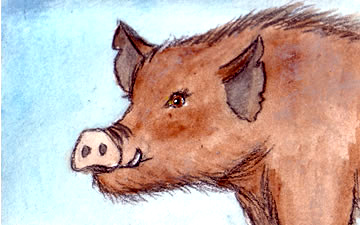
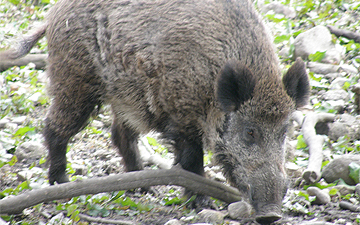
1 POINTS
Play: Sus scrofa has a MOVE of 2.
Fact: Sus scrofa is the wild ancestor of the domestic pig.
cold, cool, warm
Graphic by h.c. O'Neillwww.rainydaypaperback.com
Photo by Volker.Gcommons.wikimedia.org/wiki/File:Wildschwein_12.4.2008_117.jpg
Wild boar (Sus scrofa) is a species of pig (including many subspecies), part of the biological family Suidae. It is the wild ancestor of the domestic pig, an animal with which it freely hybridises.[2] Wild boar are native across much of Northern and Central Europe, the Mediterranean Region (including North Africa’s Atlas Mountains) and much […] read more

Euglena velata
Euglena velata

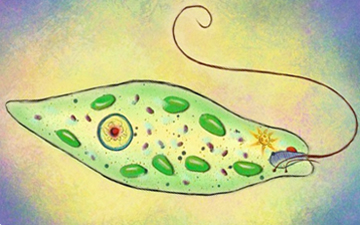
Sorry, there is no photo available. If you have one, please submit
here
.
6 POINTS • E. velata can also be considered photosynthetic (FOOD CHAIN 1). However, only herbivores of SCALE 4 or lower can feed on E. Velata.
Cool, Warm
Graphic by Gasper Mlakarnightpisces.deviantart.com/
Euglena is a genus of unicellular protists, of the class Euglenoidea of the phylum Euglenozoa (also known as Euglenophyta). They are single-celled organisms. Currently, over 1,000 species of Euglena have been described. There are many to be discovered. Marin et al. (2003) revised the genus to include several species without chloroplasts, formerly classified as Astasia […] read more